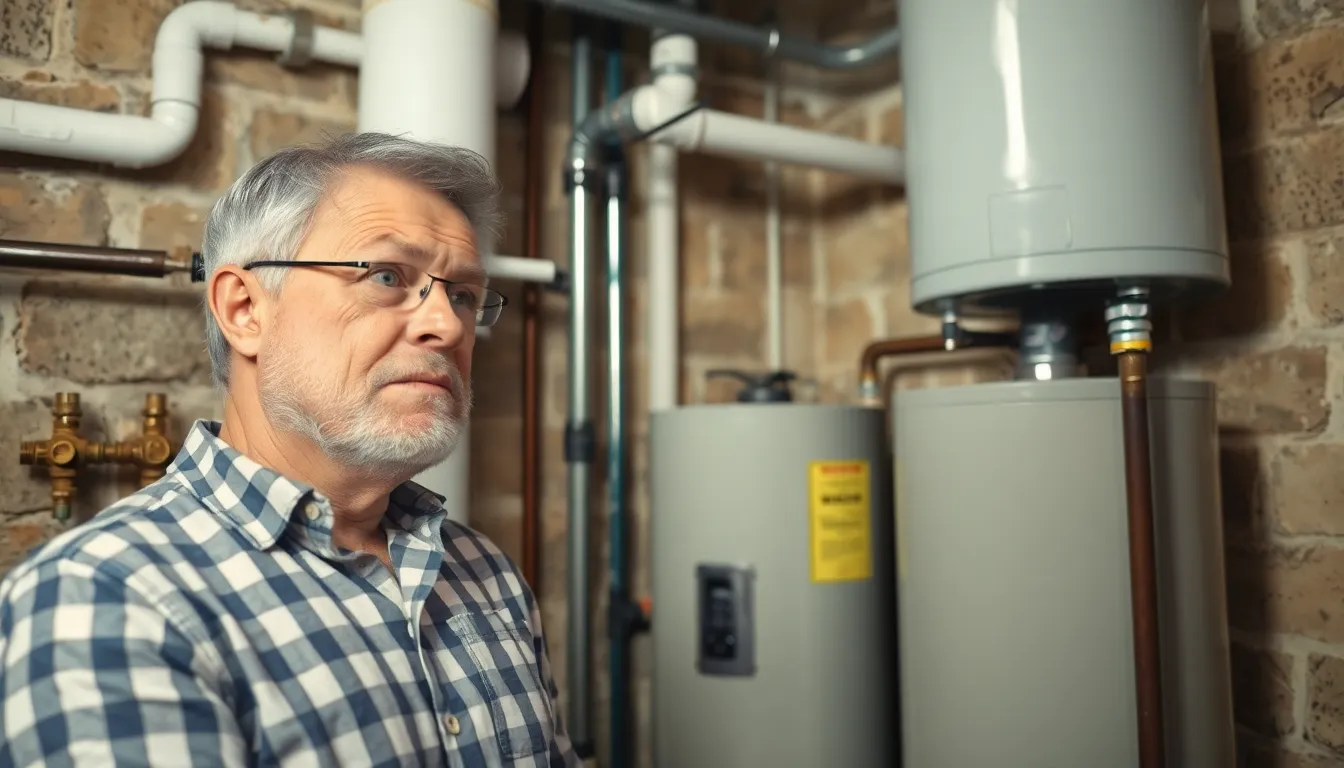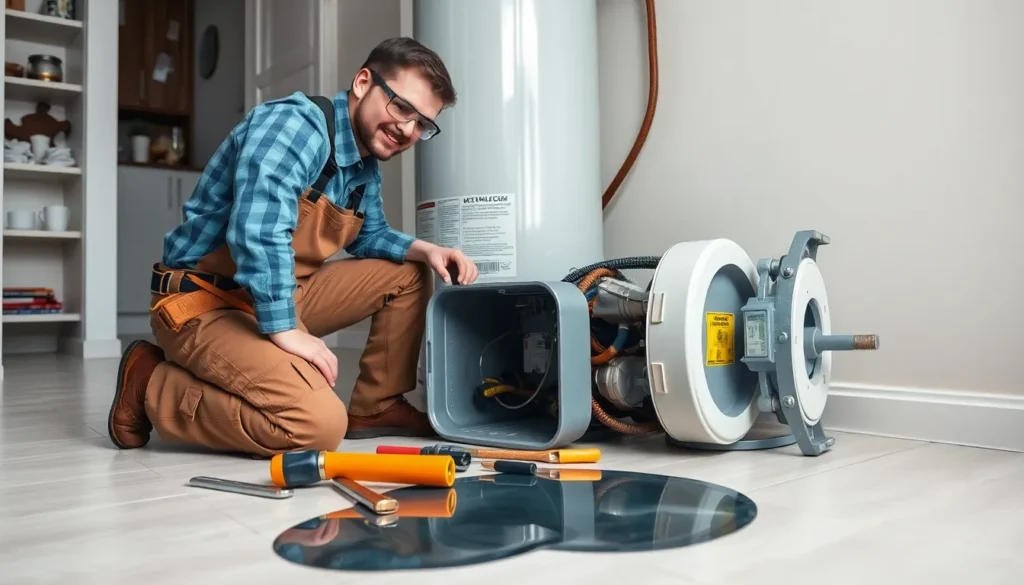Table of Contents
ToggleImagine stepping into the shower, ready for a refreshing start to your day, only to be greeted by a blast of icy water. Talk about a wake-up call! When hot water systems go awry, it can feel like the universe is conspiring against your morning routine. But don’t worry; help is just around the corner.
Understanding Hot Water Service Repair
Hot water systems are vital for everyday comfort. Keeping them maintained prevents unexpected cold showers.
Importance of Regular Maintenance
Regular maintenance of hot water systems ensures efficiency and longevity. Inspections help detect issues before they escalate. Cleaning filters and flushing tanks enhance performance. Hot water systems that receive routine care often have reduced energy costs, resulting in savings over time. Scheduled services keep warranties valid and prevent potential hazards. Homeowners benefit from peace of mind knowing their systems are functioning properly.
Common Issues with Hot Water Systems
Several common issues can affect hot water systems. Sediment buildup reduces heating efficiency, leading to lukewarm water. Malfunctioning thermostats can cause inconsistent temperatures or complete heating failure. Leaks from pipes or tanks often stem from rust or corrosion, requiring prompt attention. Anode rod depletion exposes tanks to corrosion, accelerating deterioration. Regular troubleshooting helps identify these problems early, improving system reliability and performance.
Signs You Need Hot Water Service Repair

Homeowners should remain vigilant for signs indicating a hot water system that requires attention. Recognizing these signs early can prevent more significant issues down the line.
Unusual Noises
Unusual noises from the hot water system serve as a critical indicator of potential problems. Banging or popping sounds often suggest sediment buildup inside the tank. This buildup can impede efficiency and lead to further damage. Hissing sounds might indicate a leak, which requires immediate action to prevent water damage. Other sounds, like whistling, may also point to pressure issues within the unit. Listening carefully to these noises helps homeowners assess their hot water systems promptly.
Fluctuating Water Temperatures
Fluctuating water temperatures indicate that the hot water system may not be functioning properly. If the water alternates between hot and cold unexpectedly, it could signal a malfunctioning thermostat or a broken heating element. Inconsistent temperatures disrupt daily tasks, like showering or washing dishes. Observing these fluctuations more consistently might reveal underlying issues needing professional attention. Maintaining stable water temperatures benefits comfort and system efficiency, making prompt repairs essential.
DIY Troubleshooting Tips
Homeowners can address some common hot water system issues with simple troubleshooting techniques. Quick checks can help save on repair costs and system downtime.
Checking the Thermostat
Thermostat settings play a crucial role in hot water temperature. First, check if it’s set to the desired temperature range, typically between 120°F and 140°F. If temperatures fluctuate, inspect the thermostat for any damage or calibration issues. These adjustments often resolve inconsistencies in hot water. Resetting or replacing a faulty thermostat can also restore proper function. Homeowners may also consider consulting the manufacturer’s instructions for specific guidelines related to their model.
Inspecting for Leaks
Leaks can signal significant issues within the hot water system. First, inspect for water pooling around the unit, which may indicate a leaking pipe or valve. Next, examine connections, fittings, and the tank itself for signs of corrosion or moisture. Small leaks often require quick fixes, while larger leaks may necessitate professional assistance. Homeowners can tighten loose connections to help reduce minor leaks. Regular visual inspections assist in detecting any problems early, preventing costly repairs later.
When to Call a Professional
Certain hot water system problems require immediate professional intervention. Homeowners should recognize when issues exceed basic troubleshooting capabilities.
Benefits of Professional Repair
Expert repairs often ensure durable solutions. Skilled technicians can quickly identify root causes of persistent issues. Additionally, professionals use specialized tools, which leads to efficient repairs. Warranty coverage may also apply when professionals handle repairs, protecting homeowners from unexpected expenses. Furthermore, expert assistance can enhance the system’s lifespan and ensure compliance with safety regulations. Homeowners enjoy peace of mind knowing that repairs adhere to industry standards.
Choosing the Right Service Provider
Selecting a qualified service provider is crucial for effective repairs. Start by researching local reviews and ratings. Referral recommendations from family or friends can lead to reliable technicians. Verify that the chosen provider has relevant licenses and insurance. It’s advisable to request detailed quotes to compare services and pricing. Inquire about warranties for parts and services offered. Finally, prioritize providers that exhibit strong customer service and communication to ensure a positive experience throughout the process.
Cost Factors in Hot Water Service Repair
Understanding cost factors in hot water service repair helps homeowners budget effectively. Various elements contribute to the overall expenses involved.
Average Repair Costs
Typical repair costs for hot water systems range from $150 to $600. Homeowners might pay around $450 on average. Simple fixes, like replacing thermostats or heating elements, generally set individuals back about $150 to $300. More complex issues, such as significant leak repairs or tank replacements, can escalate costs to between $400 and $800. It’s beneficial to obtain multiple quotes to ensure competitive pricing.
Factors Affecting Pricing
Several factors influence pricing for hot water service repair. The age and type of the water heater play a role in repair complexity. Conventional tank heaters often involve easier repairs compared to tankless systems. Geographic location can also impact labor rates, making repairs pricier in high-demand areas. Access to the unit affects repair costs; challenging installations may incur higher fees. Finally, the extent of damage determines necessary repairs; more extensive issues often translate to increased expenses.
Addressing hot water service repair is essential for maintaining comfort and efficiency in any home. Homeowners should remain proactive by recognizing signs of potential issues and conducting regular inspections. By staying vigilant and performing basic troubleshooting, they can often prevent minor problems from escalating.
When faced with complex repairs, enlisting the help of a qualified professional can ensure reliable solutions and extend the lifespan of the hot water system. Understanding the cost factors involved allows homeowners to budget effectively and make informed decisions about repairs. Ultimately, prioritizing maintenance and timely repairs can lead to a more efficient and dependable hot water system.





